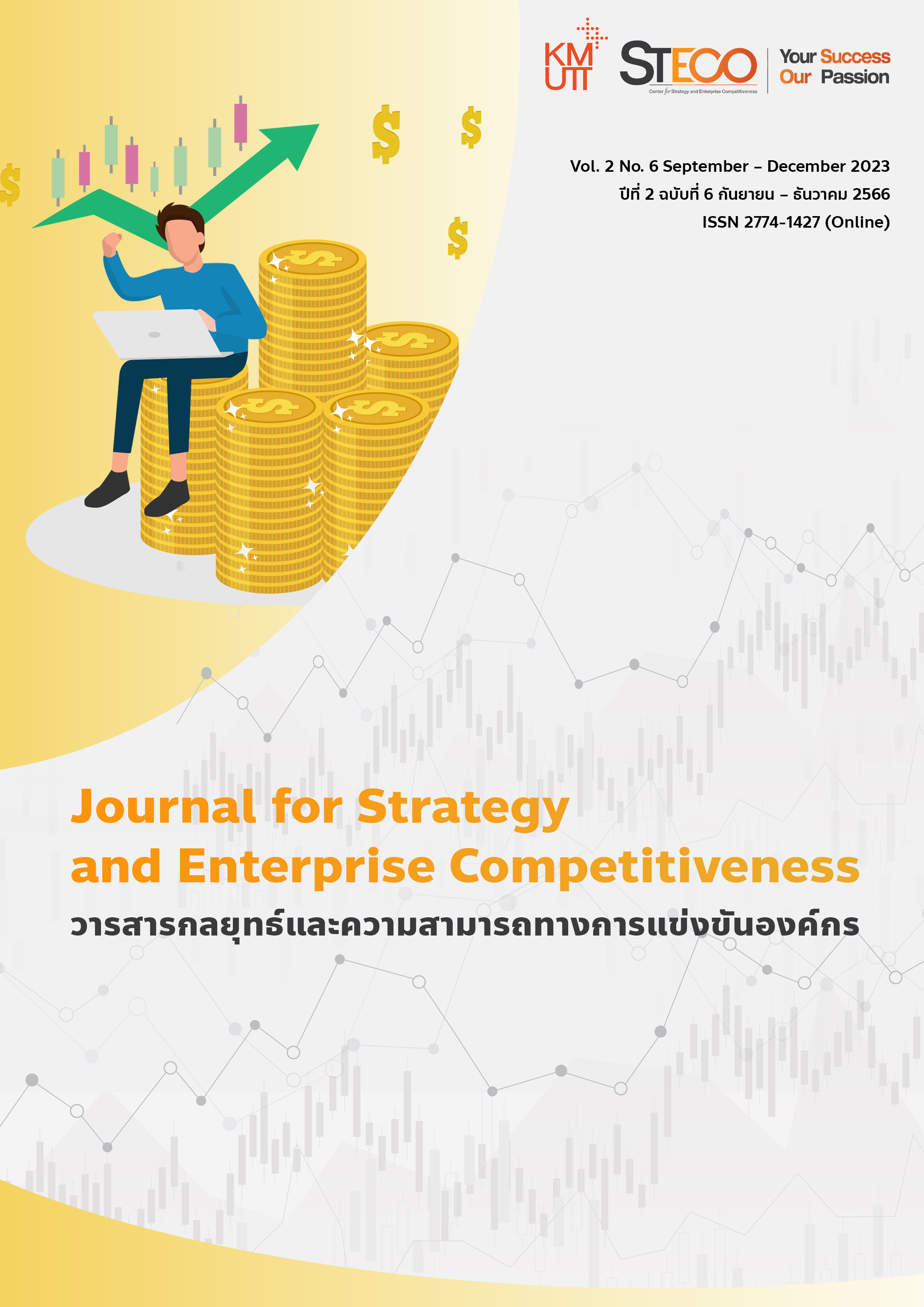The Study of Business Organization Negotiation Key Success Factor at the Operational Level
Keywords:
negotiation, business to business (b2b), businessAbstract
The objectives of this research article are 1) to study the factors affecting the success in negotiations of business organizations, and 2) to present guidelines for negotiations of business organizations at the operational level. The results of negotiations lead to results that the organization is satisfied with. Moreover, failed negotiations may affect the organization's competitiveness. Quantitative study of 214 people using online questionnaires as a tool to collect data from personnel in private business units who have experience in conducting business-to-business negotiations.
The results of the study found that background factors, environment factors, and negotiation process affects the success of the organization's negotiations. In addition, the results of the organization's negotiation success are at a high level and the appropriate business negotiation approach is to have goals or interests that are consistent with those of the negotiating partner, creating a cooperative environment communication and language that is easy to understand Including reliable agreements to ensure effective and successful negotiations.
References
Agndal, H. (2007). Current trends in business negotiation research: An overview of articles published 1996-2005. SSE/EFI Working Paper Series in Business Administration, 2007(003), 1-46.
Agndal, H., Åge, L. J., and Frick, E. J. (2017). Two decades of business negotiation research: an overview and suggestions for future studies. Journal of Business & Industrial Marketing, 32(4), 487-504. https://doi.org/10.1108/JBIM-11-2015-0233
Balliu, T., and Spahiu, A. (2020). Pre-Negotiation Activities: A Study of the Main Activities Undertaken by the Negotiators as Preparation for Negotiation. European Journal of Economics and Business Studies, 6(2), 75-86. https://doi.org/10.26417/453dog90l
Bodendorf, F., Hollweck, B., and Franke, J. (2022). Information Asymmetry in Business-to-Business Negotiations: A Game Theoretical Approach to Support Purchasing Decisions with Suppliers. Group Decision and Negotiation, 31(4), 723–745. https://doi.org/10.1007/s10726-022-09780-3
Chen, X., Wang, X., Zhu, X., and Amoah, A. J. (2020). To share or withhold? Contract negotiation in buyer–supplier–supplier triads. Industrial Management & Data Systems, 120(1), 98-127. https://doi.org/10.1108/IMDS-07-2019-0374
Cochran, W. G., (1977). Sampling techniques. Wiley.
Geiger, I. (2020). From Letter to Twitter: A Systematic Review of Communication Media in Negotiation. Group Decision & Negotiation, 29, 207–250. https://doi.org/10.1007/s10726-020-09662-6
Ghauri, P. N., and Usunier, J. C. (2003). International business negotiations. Emerald Group Publishing.
Ikle, F. C. (1964). How nations negotiate. Harper & Row. http://digilib.fisipol.ugm.ac.id/handle/15717717/12083
Ketusing, W. (1995). Statistics Used in Research. Division of Research.
Lawrence, J. U. (2021). Masterful Negotiations: How to Prepare for a Win–Win Result. Licensing Journal, 12-15.
Maneerat, S. (2017). Negotiation for teachers. Veridian E-Journal, Silpakorn University, 10(2), 2463-2474.
Mazibuko, N. E., and Burhan, A. M. (2016). Perceptions of Negotiation Behaviour in a Global Firm. International Journal of Interdisciplinary Social Sciences: Annual Review, 11(1), 71-86. https://doi.org/10.18848/1833-1882/CGP/71-86
Nikola, S., and Zdenek, S. (2021). Business E-NeGotiAtion: A Method Using a Genetic Algorithm for Online Dispute Resolution in B2B Relationships. Journal of Theoretical & Applied Electronic Commerce Research, 16, 1186-1216. https://doi.org/10.3390/jtaer16050067
Niphonpittaya, T. (2018). Negotiations in Public Management. The journal of Research and Academic, 1(2), 137-153.
Pongwichai, S. (2009). Computing Analysis of Statistical Data. (20th Edition), Bangkok: Chulalongkorn University.
Runglertkriangkrai, S., and Somboonkul, Y. (2010). Business and social responsibility. Journal of management sciences, 27(1), 65-76.
Schachter, H. (2017). Six main reasons why negotiations fail. Retrieved from https://www.theglobeandmail.com/report-on-business/careers/management/six-main-reasons-why-negotiations-fail/article36920723/#:~:text=Negotiations%20will%20fail%20if%20you,deal%20%E2%80%93%20and%20unbending%20on%20time
Schoop, M. (2021). Negotiation communication revisited. Central European Journal of Operations Research, 29(1), 163-176. https://doi.org/10.1007/s10100-020-00730-5
Sigurdardottir, G. A., Gil, U. A., and Candi, M. (2018). B2B negotiation tactics in creative sectors. Journal of Business & Industrial Marketing, 33(4), 429-441. https://doi.org/10.1108/JBIM-10-2016-0232

Downloads
Published
How to Cite
Issue
Section
License
Copyright (c) 2023 Journal for Strategy and Enterprise Competitiveness

This work is licensed under a Creative Commons Attribution-NonCommercial-NoDerivatives 4.0 International License.
The opinions appearing in the content of articles of Journal for strategy and enterprise competitiveness. It is the opinion and responsibility of the article author. It is not the opinion and responsibility of the Center for strategy and enterprise competitiveness, King Mongkut's University of Technology Thonburi
Articles, information, content and images, etc., in the Journal for strategy and enterprise competitiveness. It is the exclusive copyright of the Center for strategy and enterprise competitiveness, King Mongkut's University of Technology Thonburi. If an individual or entity wants to distribute all or part of the content or for any action must obtain written permission from the Center for Strategy and enterprise Competitiveness, King Mongkut's University of Technology Thonburi.


